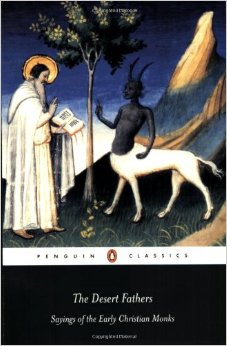 I read a few excerpts last night before bed from The Desert Fathers: Sayings of the Early Christian Monks. The first chapter is entitled “Progress in Perfection” and perhaps summarises some of the main concerns of the early desert fathers, though I guess the rest of the collection will either confirm or disconfirm that.
I read a few excerpts last night before bed from The Desert Fathers: Sayings of the Early Christian Monks. The first chapter is entitled “Progress in Perfection” and perhaps summarises some of the main concerns of the early desert fathers, though I guess the rest of the collection will either confirm or disconfirm that.
The sayings reflect the asceticism of the early fathers but it is not an extreme asceticism, although a couple of the sayings are certainly idealistic. The main concerns are with humility and detachment from material possessions, or more generally, with self-control. Here are a few sayings that struck me, and which require me to put a big F against my name in measuring up to their spiritual concerns:
2. Pambo said to Antony, “What shall I do?’ Antony said, ‘Do not trust in your own righteousness. Do not go on sorrowing over a deed that is past. Keep your tongue and your belly under control.’
3. Gregory said, ‘God asks three things of anyone who is baptized: to keep the true faith with all his soul and all his might; to control his tongue; to be chaste in his body.’
But a couple of other sayings also proved encouraging:
10. Cassian told this story about John, who was the father of a community because he was great in his way of life. When he was dying, he was cheerful, and his mind was set upon the Lord; his brothers stood around him and asked for a sentence that would sum up the way to salvation, which he could give them as a legacy by which they might rise to the perfection that is in Christ. With a sigh he said, ‘I have never obeyed my own will, and I never taught anyone to do anything which I did not do myself first.’
11. A brother asked a hermit, ‘Tell me something good that I may do it and live by it.’ The hermit said, ‘God alone knows what is good. But I have heard that one of the hermits asked the great Nesteros, who was a friend of Antony, ‘What good work shall I do?’ and he replied, ‘Surely all works please God equally? Scripture says, Abraham was hospitable and God was with him; Elijah loved quiet and God was with him; David was humble and God was with him.’ So whatever you find you are drawn to in following God’s will, do it and let your heart be at peace.’
And so one more to finish with a challenge:
15. Poemen said, ‘If a monk hates two things, he can be free of this world.’ A brother inquired, ‘What are they?’ He said, ‘Bodily comfort and conceit.’
Now let me sit back with a drink and a chocolate biscuit and see how many hits and comments this post receives…